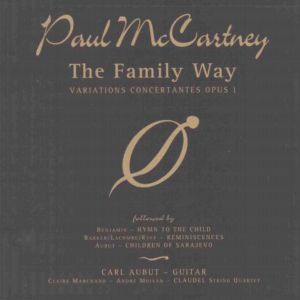
- Format: MP3

Several classical variations around "The Family Way" theme as played by Carl Aubut, Claire Marchand, André Moisan and arranged by George Martin & Carl Aubut.
On this disc, McCartney is considered as a classical composer like Mozart, Bach or Beethoven. That's why his name is on the disc.
Only tracks 1-9 are variations around "The Family Way". The other tracks have nothing to do with McCartney nor with George Martin.
While on a break between Revolver and Sgt. Pepper in late 1966, and with touring now out of the question and John Lennon off making the film How I Won the War, Paul McCartney tried his hand at a film score — with a lot of help from Beatles arranger/producer George Martin. The rather pleasing result is one of the most elusive souvenirs of the Beatles' high tide in the '60s, long out of print, and commanding sky-high prices on the collectors' circuit. Only 24 minutes in length, the album is a collection of film cues based on a single McCartney tune, "Love in the Open Air," a plaintive melody reminiscent in some ways of "Here, There and Everywhere." (McCartney has since said that Johnny Mercer was planning to write lyrics for the song, but McCartney passed on it because at the time, he had never heard of Mercer.) The resourceful Martin then subjects McCartney's tune to variations and restatements in several kinds of orchestrations — including, among other combinations, a proper British brass band; Duane Eddy-style guitar with soul organ; a small group with chamber strings, flutes, and classical guitar; and pre-echoes of Sgt. Pepper-era trumpets. The whole project reflects McCartney's melodic and harmonic bents, as well as Martin's distinct orchestral personality — along with some commercial touches that definitively date this score as a product of the 1960s. It also should have pointed the way toward McCartney's classical collaborations with Martin, which might have produced some masterful work (McCartney, though, chose to work with other, less-simpatico orchestrators way off in the future). A United Artists single issued under the name of the George Martin Orchestra in 1967 offers a completely different, rock-edged treatment of "Love in the Open Air" — even including some then-fashionable Tijuana Brass-style horns. This, too, will be difficult to locate.